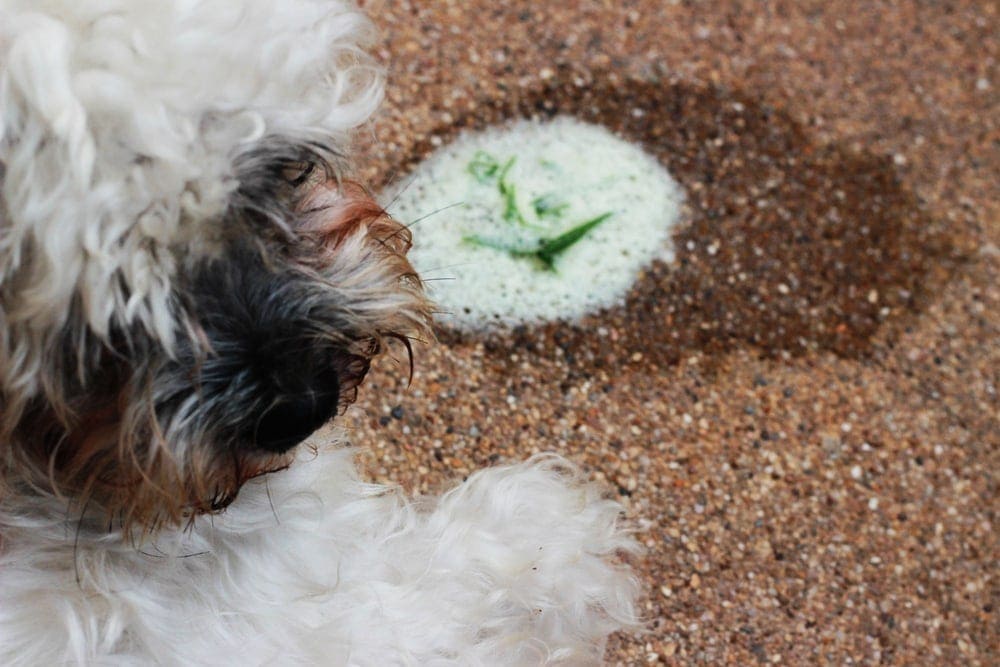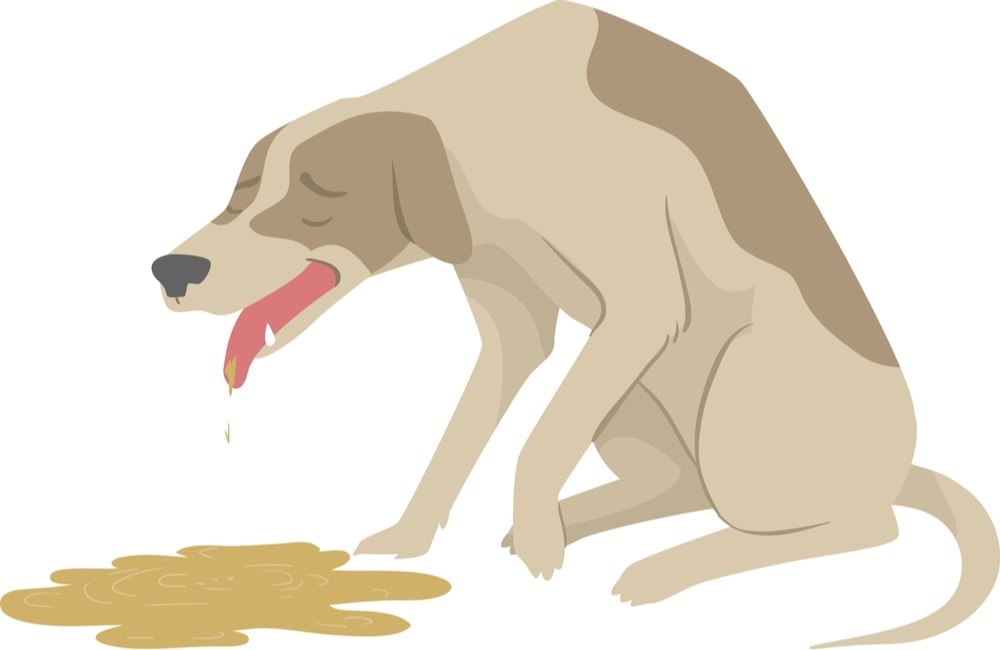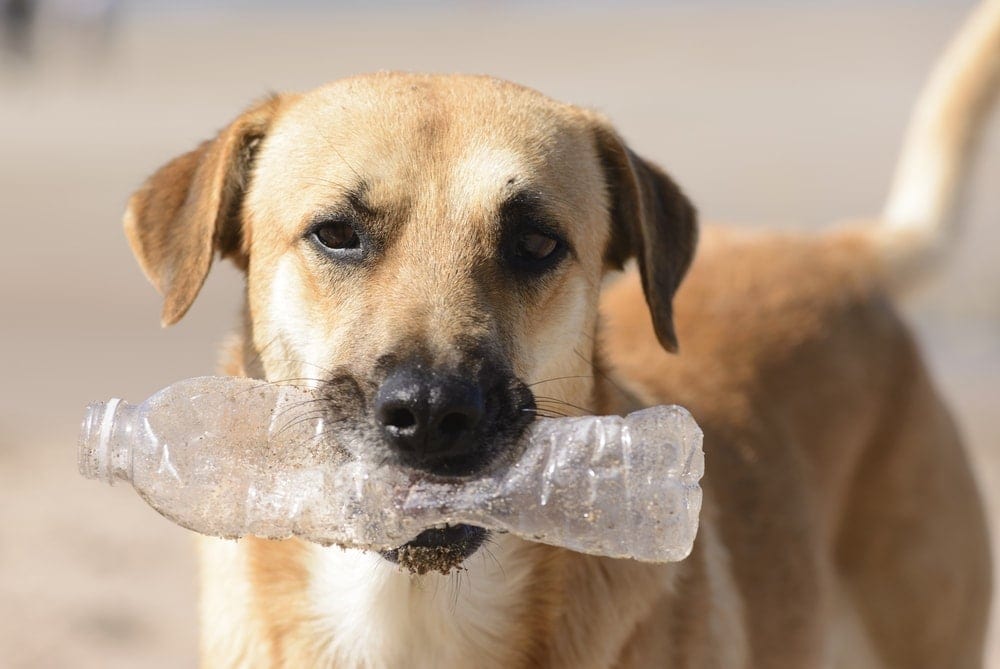Retching behavior doesn’t necessarily mean that your dog is sick, but it can be indicative of other problems.
If your dog is dry heaving with no vomit, there are multiple explanations that you should learn about. This information will ensure that your pet gets the care it needs.
Reasons for Retching in Dogs
Before you can learn what to do about your dog’s retching, you first need to learn about some of the possible reasons for it.
1. Something is Stuck in Their Throat
An obstruction of some kind could be blocking your dog’s throat, making it incapable of breathing normally. They could be retching as a way of trying to get the object out of their throat. This could be anything from a small rock to a piece of their own toy.
If you’ve noticed that your dog is drooling, pacing or making strained breathing sounds, it is possible they have something in their throat. This is especially common with smaller dogs that have a more difficult time swallowing larger things.
If your dog’s retching has gotten progressively worse over time, they might have a tumor on their throat. As the tumor grows larger, it becomes increasingly difficult for them to swallow properly.
2. Weakened Trachea
Some dogs have a birth defect that ultimately leads to their trachea becoming increasingly weaker over time. This makes it difficult to swallow normally, which can result in retching. Dogs that have this issue typically cough a lot and dry heave. You might even notice them throw up food once in a while.
3. Bloat
Bloat is something that happens to dogs when they swallow a lot of air at once. The stomach fills with gas and expands temporarily. This can lead your dog to retch and look like it is going throw up.
You might also notice shallow breathing or pacing back and forth. While bloat typically doesn’t last very long, it can cause your dog a lot of discomforts.
4. Gastrointestinal Problems
It is possible that your dog is struggling with gastrointestinal problems. This can range from irritable bowel syndrome to gastroenteritis. There are many different conditions that affect this system within a dog’s body.
Any condition that is capable of disturbing the gastrointestinal system can cause retching. Even a tumor in your dog’s stomach can cause this symptom. While some gastrointestinal conditions are fairly mild, others are far more serious.

Some of the more common symptoms associated with these conditions include:
- Nausea
- Vomiting
- Lack of appetite
- Weight loss
- Excessive gas
- Constipation
5. Anxiety
An anxious dog can behave in a number of ways that seem strange or concerning. It is possible that your dog is so nervous that their digestive system has become inflamed and upset. If you’ve moved into a new home with your dog, they could be adjusting to their surroundings.
There are other things that make dogs extremely anxious, such as larger dogs. When you bring home a big dog, a smaller one can feel intimidated and frightened at first. This added anxiety can manifest in lots of different ways, including retching.
6. Eating Human Food
Your dog might start retching if it has eaten some human food, especially if it is spicy.
What to Do about Your Dog’s Retching
If your dog is retching over and over, you will need to take action. The sooner you do something about this, the sooner your dog will start feeling better.
1. Check Your Dog’s Throat
The first thing you want to do is to check your dog’s throat for any obstructions. You can try using a flashlight to see if there is anything inside your dog’s throat that is stuck. This is a common reason for retching with dogs. You might not be able to see the object if it is small or deep down in their throat.

2. Induce Vomiting
Inducing vomiting with hydrogen peroxide can be a good way to get something out of your dog’s throat that is currently stuck. You will, however, want to call your veterinarian first to make sure it is okay to do this.
3. Take Your Dog to the Vet
If you cannot seem to stop your dog’s retching at home, you’ll need to take them to the vet. This is something that you’ll want to do if your dog keeps coughing or seems to have problems breathing normally.
If your dog has a weakened trachea due to a birth defect, your vet will likely prescribe an anti-inflammatory medication. While there is no cure for this particular issue, certain medications can help manage the symptoms. This should go a long way towards improving your dog’s overall quality of life.
Your veterinarian will likely want to perform an X-RAY or ultrasound to make sure that nothing is stuck inside your dog’s throat. It can be difficult to tell just by looking down the throat, so further testing is often needed. They might also check for the presence of a tumor, which could be cancerous and pose a threat to your dog’s life.
Conclusion
- Dogs can retch for a number of reasons, some of which can be quite serious.
- Smaller dogs are more likely to develop an obstruction in their throat due to swallowing something they shouldn’t have.
- Some dogs are born with a defect that weakens their trachea, making it harder to swallow normally. Retching is a common side effect of this condition.
- Your dog could be experiencing bloat, which causes the stomach to expand with gas when a lot of air is taken in at once.
- There are numerous gastrointestinal issues that can cause a dog to retch, such as irritable bowel syndrome.
- If your dog ate some sort of human food (especially something spicy), they may start to retch.
- It is important that you take your dog to the veterinarian right away if you see that your dog is having problems breathing properly.
- Your vet can check your dog’s throat for obstructions to make sure nothing is lodged in it.
- If you see an object stuck in your dog’s throat, you may want to try inducing vomiting.
Sources:
- Retching in Dogs – Wag
- Dog Retching – Allthingsdogs











